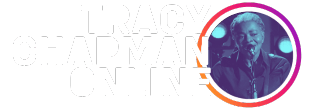In 2017, Tracy Chapman gave an interview to the German newspaper Spiegel in which she recalled her incredible performance at Nelson Mandela’s 70th birthday concert at Wembley Stadium in London on 11 June 1988. Originally published in German, here is the English translation of this amazing interview! The article was entitled: “Mandela changed my life”
Just this young woman with a guitar on a huge stage: Tracy Chapman came out of nowhere to become a global star on 11 June 1988. Here she talks about the London solo concert for Nelson Mandela – and what happened next.
By Alex Gernandt, Spiegel, June 11, 2017
SPIEGEL: Ms Chapman, your debut album was released in April 1988 – just two months later, on 11 June, 600 million people got to know you.
TRACY CHAPMAN: And I owe that entirely to Nelson Mandela. The fact that I got to play his birthday concert in London as a newcomer was a great stroke of luck. It was his 70th birthday, although Mandela’s actual birthday wasn’t until 18 July. For logistical reasons, the festival, which included Sting, Phil Collins, Harry Belafonte, Peter Gabriel and Whitney Houston, had to be held a few weeks earlier. We all celebrated Mandela, who was still in prison, at a sold-out Wembley Stadium.
SPIEGEL: More than 70,000 people attended the concert, which was broadcast live in 60 countries. Were you extremely nervous?
TRACY CHAPMAN: Absolutely! I was a complete beginner and had only ever sung in front of small audiences in cafés. Suddenly I was standing in front of this huge backdrop for an earth-shattering event. I tried not to let the stage fright show: Breathe in, breathe out. Backstage I met Chrissie Hynde, who was also performing. Like me, she’s from Ohio, which made me feel connected and took away some of my fear. I’m still nervous before gigs, by the way. I think that’s a good thing, it makes you work harder.
SPIEGEL: At the Mandela concert you were only 24 and still unknown. Why did you perform twice?
TRACY CHAPMAN: I went on stage in the afternoon, played my songs as planned and was surprised to get so much applause right away. Later there were technical problems with a keyboard during Stevie Wonder’s set and he had to cut his set short. To fill the gap, the organisers had the idea of sending me out again with my acoustic guitar. So I performed a second time and my songs like “Talkin’ bout a Revolution” and “Fast Car” stayed with the fans. It was a great opportunity – and my breakthrough.
SPIEGEL: You were later able to meet Nelson Mandela in person. What was that like?
TRACY CHAPMAN: A great moment, my God, it was almost 30 years ago. I met him in New York in 1990, just after he was released. Mandela gave me a big hug and thanked me for my support and solidarity. I will never forget that. He radiated great warmth and humility, with an indescribable charisma. Unfortunately, the meeting was very short. I had read his biography and books on South African history. I was really euphoric when he was released from prison after more than 25 years – and his resistance against apartheid was successful in the end.
SPIEGEL: After the Wembley concert, your first album sold 20 million copies worldwide, in Germany even more than Pink Floyd’s “The Wall” and Michael Jackson’s “Thriller”.
TRACY CHAPMAN: Yeah, amazing! My record company had expected sales of around 200,000 and nobody expected such a huge success, least of all me.
SPIEGEL: You come from the blue-collar town of Cleveland in Ohio. Was it a musical childhood?
TRACY CHAPMAN: My parents, who were not yet divorced at the time, had a decent record collection. There was always music playing in the house. My dad listened to jazz, my mom listened to R&B, soul and gospel. My older sister Aneta also collected records, pop, rock and Barbra Streisand musicals. Only I, as the youngest, was never allowed to operate the record player (laughs). So at the age of eight I decided to make music myself. My mother thought that learning the ukulele, guitar and piano was useless, a waste of time, but my sister admired me for it.
SPIEGEL : Were you directly confronted with racism in your youth?
TRACY CHAPMAN: Every single black person in the USA is confronted with racism, even today. Unfortunately, not much has changed for the better, you just have to turn on the news. There was a lot of racial violence in Cleveland, even in the gritty neighborhood where I grew up. Then desegregation was enforced in the schools – by court order. A lot of white people protested against this, which led to a lot of tension and riots in the streets. I was often scared. I could only distract myself a little with music.
SPIEGEL: Did you have any musical idols?
TRACY CHAPMAN: There were folk influences, probably from guitar lessons. There was very little guitar music at home, although my mother had a few Beatles records. I first heard Bob Dylan at a friend’s house in high school and was immediately fascinated, and I also liked the music of Joni Mitchell and Simon & Garfunkel. I really liked those quiet songs, they influenced my songwriting – but musicians were never my heroes.
SPIEGEL: Great musical talent, but at the same time you excelled at school – were you a child prodigy?
TRACY CHAPMAN: Well, I was a pretty good student, but certainly not a child prodigy. When I was 15, I won a scholarship to the prestigious Wooster School in Connecticut and then went to Tufts University near Boston. The scholarship was a stroke of luck, arranged by my teacher at the time. My mother wasn’t thrilled at all and didn’t want to let me go, but then she realised that I was probably better off in Connecticut than in the ghetto in Cleveland. Growing up, I always dreamed of going to college, but my mother didn’t have the money for higher education. She was happy if she could pay the rent and keep the fridge stocked. You could say that the scholarship and college kept me out of the ghetto.
SPIEGEL: How did you find your feet, alone and so young?
TRACY CHAPMAN: I had to grow up fast. It wasn’t easy. But the people I met welcomed me and helped me. That was incredibly important because I was starting a whole new life in an unknown world. An adventure.
SPIEGEL: Music wasn’t more than a hobby back then?
TRACY CHAPMAN: No. I liked to write songs in my spare time and perform them in front of small audiences in cafes, clubs or sometimes in Harvard Square in Cambridge, Massachusetts. I played folk and blues, not popular hits from the charts.
SPIEGEL: And then a fellow student heard you in the “Cappuchino” café.
TRACY CHAPMAN: Yeah, a young guy called Brian Koppelman, he was a year below me, and he loved my voice. He said his father Charles was a big manager in the music business and could help me get a record deal. But I didn’t want that at all. I wanted to continue my studies, get my Masters in Anthropology and then get a job.
SPIEGEL: It turned out differently. Suddenly you were in Hollywood recording your debut album.
TRACY CHAPMAN: I was persuaded. Hollywood was a real culture shock for me, the little girl from Cleveland. The record company booked the legendary Chateau Marmont Hotel, where all the big stars stayed. There was no room service, so one morning I asked the front desk if they could recommend a restaurant for breakfast – within walking distance, please. They just laughed: Nobody walks in Hollywood! I felt pretty stupid.
SPIEGEL: Was working with producer David Kershenbaum more pleasant?
TRACY CHAPMAN: He was a great guy. He had worked with people like Joan Baez, Joe Jackson, Cat Stevens and Supertramp, all of whom I admired. We connected very quickly. Recording my own songs in a professional studio was great fun, a real experience. There’s a photo of David and me at work – and I’m beaming. Normally I never smile in photographs. That says it all.
SPIEGEL: You became a world star overnight – how did you deal with the hype after the Wembley concert?
TRACY CHAPMAN: Nothing was the same after that. Of course I was happy that people liked my music so much. But I was also scared because it all happened so fast. And I don’t care about fame. I don’t like being the centre of attention – except when I’m on stage singing my songs.
SPIEGEL: Is that why you’ve made yourself so scarce in recent years?
TRACY CHAPMAN: I’ve allowed myself the luxury of only doing selected projects that I really believe in. A year and a half ago my best songs were released on a greatest hits album and I sang “Stand by Me” on David Letterman’s talk show. And I performed in honour of Buddy Guy at the Kennedy Center Honors in Washington in front of Michelle and Barack Obama. So I haven’t been completely off the radar. But I have to admit I don’t like touring as much anymore. I probably used to do it too much.
SPIEGEL: And how do you spend your days now?
TRACY CHAPMAN: I am lucky to live in San Francisco, one of the most beautiful cities in America. I go to the beach a lot, I go hiking, I’m out in nature and I like to be around people. I don’t want to stay at home, I want to take part in life, because that’s how I find new themes and inspiration for my songs. And one thing is clear: I’m definitely too young to retire.
SPIEGEL: Is it true that you prefer to write your songs in bed?
TRACY CHAPMAN: There’s definitely a guitar next to me. You never know.


